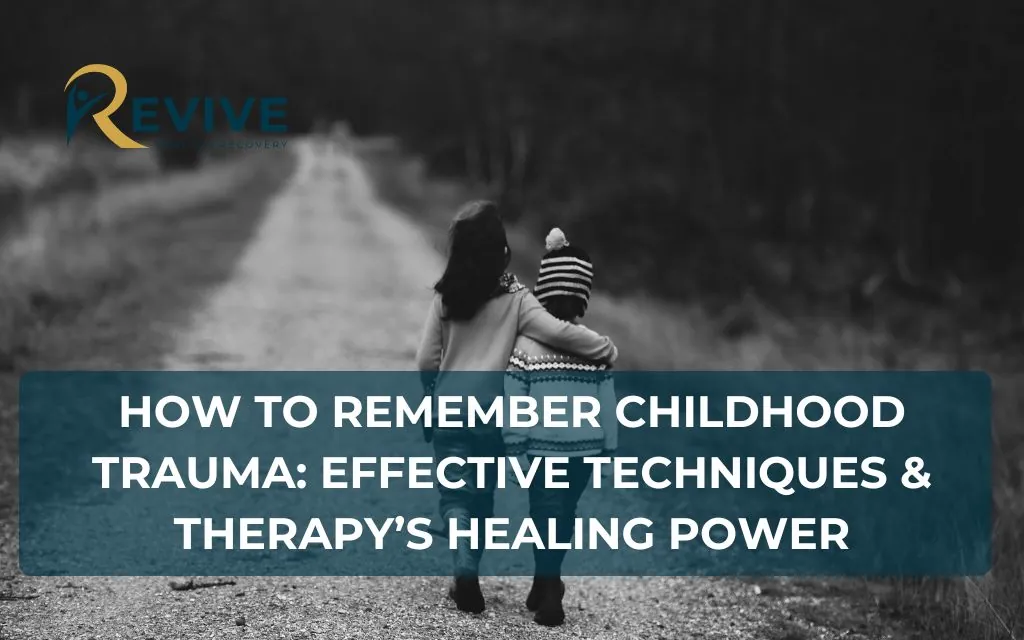The journey of healing from childhood trauma often begins with addressing memories that your mind has protected you from. Understanding how to remember childhood trauma safely requires professional guidance, especially when these memories impact your daily functioning. At Revive Health Recovery in Denver, we recognize the courage it takes to confront your past and offer evidence-based approaches to support this delicate process.
According to SAMHSA, over two-thirds of children experience trauma by age 16. Many Denver residents carry these experiences into adulthood, often without fully recognizing their impact. The brain’s protective mechanisms sometimes shield us from these memories, but proper recovery may require carefully accessing them with professional support.
Understanding Childhood Trauma: The Science and Impact
What Is Childhood Trauma and Why Is It Hard to Remember?
Childhood trauma encompasses experiences such as physical abuse, emotional neglect, witnessing violence, or enduring disasters that overwhelm a child’s coping abilities. The brain often protects itself through mechanisms like memory suppression or dissociation.
To learn more about what causes childhood trauma, explore our detailed guide.
Repressed memories occur when traumatic experiences become inaccessible to conscious recall. This happens through state-dependent memory—where memories formed in one emotional state become difficult to access in another. This explains why trauma recall techniques often focus on recreating emotional contexts safely.
How Trauma Affects the Brain and Body
Childhood trauma physically alters brain development, particularly the hippocampus (responsible for memory processing) and amygdala (our fear center). Research from “The Biological Effects of Childhood Trauma” shows that chronic trauma increases allostatic load—the wear and tear on body systems due to prolonged stress—affecting immune function, hormone regulation, and nervous system balance.
These neurobiological changes explain why trauma symptoms persist long after the events themselves, and why memory reconsolidation therapy approaches that address both brain and body are essential for comprehensive healing.
Rare and Emerging Therapies Explained
Denver offers several specialized trauma treatments:
- Trauma-Focused Cognitive Behavioral Therapy (TF-CBT) helps process traumatic memories while developing coping skills
- Eye Movement Desensitization and Reprocessing (EMDR) uses bilateral stimulation to process traumatic memories
- Hypnotherapy for repressed memories creates a relaxed state where recall may become accessible
- Neurofeedback for trauma memory helps retrain brain wave patterns disrupted by trauma
- Somatic Experiencing focuses on completing trauma responses stored in the body
Revive Health Recovery specializes in EMDR and trauma-informed care, while other Denver resources like Braincode Centers offer neurofeedback options.

Why Remembering Childhood Trauma Matters
The question often arises: “Is remembering necessary for healing?” Research suggests that while complete memory recall isn’t always essential, addressing the impact of trauma is. Many trauma specialists note that healing can occur by working with whatever memories are accessible, along with present-day symptoms. Recognizing these symptoms is a critical first step in addressing childhood trauma.
The goal isn’t necessarily to uncover every detail but to integrate fragmented experiences into a coherent narrative that allows you to move forward. This process helps reduce symptoms like anxiety, depression, and relationship difficulties that often stem from unprocessed childhood trauma.
Safe Techniques to Recall Childhood Trauma Memories
1. Gentle DIY Approaches with Caution
Some techniques may support memory processing at home, but should complement—never replace—professional therapy:
- Journaling about dreams, emotions, or body sensations that seem connected to past experiences
- Guided imagery with trauma-informed recordings
- Mindfulness practices that help you stay present while exploring difficult emotions
- Expressive arts like drawing or movement to access nonverbal memories
IMPORTANT SAFETY NOTE: These techniques should only be used alongside professional therapy. Attempting to recall significant trauma alone risks re-traumatization without proper support systems in place.
2. Therapy-Based Memory Recovery Methods
Denver offers several professional approaches to trauma recall:
Hypnotherapy for repressed memories creates a relaxed state where recall might become more accessible. Metro Denver Hypnotherapy specializes in trauma-informed hypnosis techniques.
Memory reconsolidation therapy works by accessing stored memories and updating them with new, less distressing information.
Neurofeedback trains the brain to regulate itself, potentially making trauma processing less overwhelming. Braincode Centers in Denver offers this specialized treatment.
According to the American Psychological Association, these approaches show promise when conducted by qualified professionals.

Why Safety Comes First
Any memory recovery work must prioritize safety. The risks of re-traumatization are real—attempting to recall trauma without proper support can overwhelm coping mechanisms and worsen symptoms.
Safe trauma processing requires:
- A trauma-informed therapist
- Established coping skills
- Emotional regulation techniques
- A secure support system
- Gradual, paced approach
At Revive Health Recovery, our providers create personalized safety plans before any memory processing work begins.
Finding the Right Help in Denver
How to Choose a Qualified Trauma Therapist
When searching for a therapist to help remember childhood trauma in Denver, look for:
- Specific trauma training (EMDR certification, TF-CBT, Cognitive Processing Therapy, etc.)
- Experience with your specific type of trauma
- Trauma-informed approach
- Comfort and trust in the therapeutic relationship
- Clear explanation of their process and techniques
Denver offers many qualified options, including Revive Health Recovery’s experienced trauma specialists who provide comprehensive therapy for childhood trauma in Denver. Taking time to find the right match improves outcomes significantly.
What to Expect from Trauma Therapy in Denver
Trauma therapy typically begins with:
- Comprehensive assessment of trauma history and current symptoms
- Safety and stabilization (developing coping skills)
- Gradual processing of traumatic memories
- Integration and moving forward
At Revive Health Recovery, EMDR treatments typically require 8-12 sessions, while other approaches may vary in duration. The process moves at your pace, with safety as the priority.
Costs, Insurance, and Accessibility
In Denver, trauma therapy costs typically range from $100-200 per session. Colorado mental health parity laws require insurance to cover mental health services, including trauma treatment, at the same level as physical health services.
Many therapists offer sliding scale fees based on income. Medicaid covers trauma therapy, and community mental health centers provide affordable options. At Revive Health Recovery, we work to ensure everyone can access the help they need.
Real Stories of Healing from Childhood Trauma
While everyone’s healing journey differs, success stories abound. One Revive Health Recovery client described EMDR as “unlocking memories I didn’t know I had, but in a way that felt safe.” Their symptoms decreased by approximately 70% over three months of treatment.
Another found that even without recovering specific memories, understanding how childhood patterns affected their adult relationships led to profound healing.
These stories demonstrate that healing is possible, even when complete memory recall doesn’t occur.
Learn more about effective strategies for healing childhood trauma in our comprehensive guide.

Questions to Ask Before Starting Memory Recovery
Consider asking potential therapists:
- “Is remembering necessary for my healing?”
- “How will you ensure my safety during memory work?”
- “What techniques do you use for trauma processing?”
- “What if memories emerge between sessions?”
- “How will we know when I’m ready to process memories?”
Revive Health Recovery offers free consultations to discuss these questions before beginning treatment.
Get Support at Revive Health Recovery in Denver
At Revive Health Recovery, we specialize in trauma-informed care including:
- EMDR therapy
- Trauma-Focused CBT
- Somatic approaches to trauma
- Individual and group trauma support
Our approach emphasizes safety, empowerment, and evidence-based techniques. Located at 1427 S Federal Blvd, Denver, CO 80219, we serve the greater Denver community with compassion and expertise.
Contact us at (303) 268-4655 or visit revivehealthrecovery.com for a free consultation. Our experts will help determine the safest, most effective approach to your healing journey.

FAQs about How to Remember Childhood Trauma
Is it safe to recall trauma alone?
No. Professional guidance is essential when recovering traumatic memories. Revive Health Recovery provides the necessary support to navigate this process safely.
How long does trauma therapy take?
Treatment length varies by individual needs. At Revive Health Recovery, TF-CBT typically spans 3-6 months, while EMDR often requires 8-12 sessions. Recovery isn’t rushed—safety and integration are priorities.
Does hypnotherapy work for repressed memories?
Research shows hypnotherapy can facilitate access to difficult memories in some individuals. However, accuracy varies, and it works best as part of a comprehensive treatment plan. Revive Health Recovery can refer you to qualified Denver hypnotherapists when appropriate.
Can techniques to recall childhood trauma make things worse?
Without proper guidance, yes. This is why Revive Health Recovery emphasizes safety protocols and gradual exposure. Our trauma specialists ensure you develop coping skills before processing difficult memories.
Do I need to remember everything to heal?
No. Many people heal substantially without complete memory recall. Revive Health Recovery focuses on symptom relief and present-day functioning, whether or not all memories become accessible.
Are recovered memories always accurate?
Memory is complex and can be influenced by many factors. Revive Health Recovery approaches memory work with care, focusing on the therapeutic benefit rather than establishing factual accuracy alone.
Conclusion
Learning how to remember childhood trauma is a delicate and deeply personal process – one that should always be approached with care, patience, and professional support. Denver offers numerous resources for this important work, with Revive Health Recovery standing ready to guide you through evidence-based, trauma-informed care.
Healing is possible. Whether you’re seeking therapy for the first time or continuing your recovery journey, remember that you deserve support in processing childhood trauma Denver safely and effectively.
Contact Revive Health Recovery today at (303) 268-4655 to discuss how we can support your healing path. Our trauma specialists are ready to help you navigate this journey with care and expertise.



